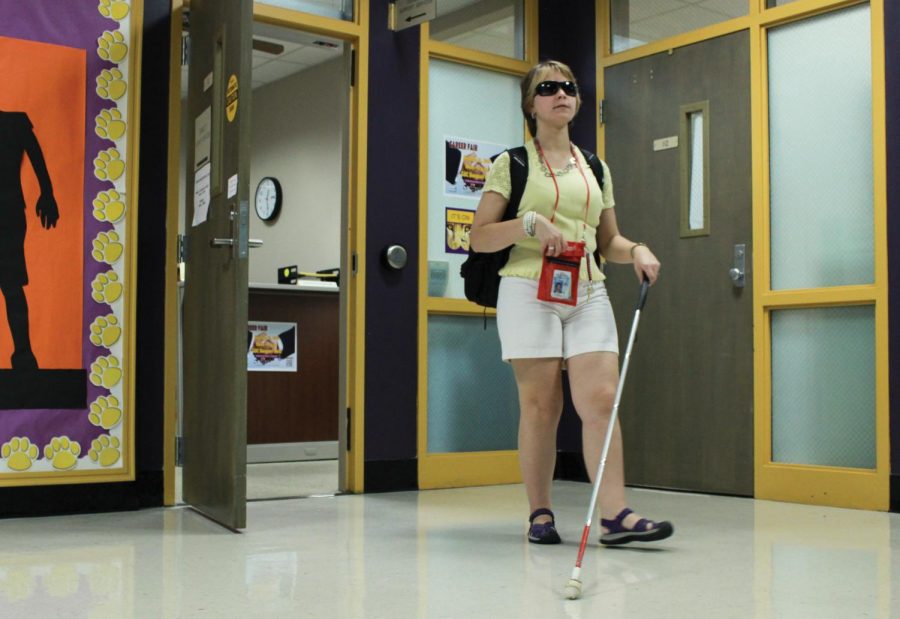Traveling campus terrain no problem for UNA’s Annie Park
October 9, 2015
Annie Park makes her way across campus, her white cane tapping against the sidewalks, floors and walls. She came to UNA this semester from the Alabama Institute for the Deaf and Blind.
Approximately 7 million people in America reported having a visual disability in 2013. In Alabama alone, the number was nearly 144,000, according to the National Federation of the Blind.
Park is legally blind, said Regional Director of the Huntsville Branch of the Alabama Institute for the Deaf and Blind Issac Beavers.
“She is a person first and blind second,” he said.
Beavers, legally blind himself, met Park when she was a 9-year-old attending public school.
She joined the Alabama Institute for the Deaf and Blind when she about 10 years old, he said. She then spent two summers working at the institute when she was a teenager.
“She would always get the work done quickly and come looking for more,” he said.
Park took the summer before entering UNA to familiarize herself with some of the technical things, such as email, that she would need to know before beginning college classes, Beavers said.
Coming to the UNA campus from the Alabama Institute for the Deaf and Blind brought with it some difficulties, Park said.
“I worked on my routes all summer,” she said. “When I first got here, it was really hard. There are more intersections, and more of the campus is open.”
Orientation and Mobility Innovator of Alabama Department Rehabilitation Services Caitlin Simpson helped Park learn her way around the campus.
“I started working with (Annie) last year when she was doing a summer job,” she said.
Park’s willingness to learn new things and tackle obstacles have helped her a lot, she said.
“Annie is a good traveler,” she said. “She has a good memory for her routes.”
Park is the first blind student I have worked with at UNA, but I worked with visually impaired students at Middle Tennessee State University, said Assistant Professor of History Carolyn Barske.
“I respect her immensely for navigating around campus,” she said. “There’s been a number of students in the class that have really become her advocates and support her. That’s nice to see.”
Park said she is learning the campus layout slowly.
“I have my cane that I use. The ball part (the tip) rolls around on the ground as I hold the other (end),” she said. “I’m able to tell whether there’s a step up or step down.”
Many students go out of their way to help her around campus, she said, but sometimes they help too much and do not give her a chance to try.
“Give blind people a chance to prove themselves,” she said. “I can get there just like you can get there. I may do it a different way than you do, and I may look for things that you may think are hazardous, and they can be hazardous if the wrong part of my body hits it.”
Learning landmarks, like telephone poles, help her navigate campus, she said.
“I was just looking for the telephone pole, which is my landmark, and the person walking behind me said, ‘you’re about to run into that pole,’” she said. “They didn’t know, and I had to explain that’s a landmark.”
Freshman Jordan Pugh said she struck up a friendship with Park after meeting her in the lobby of Mattielou Hall.
“I saw her sitting on the couch,” she said. “I decided to go over and talk to her because she was sitting alone.”
People need to understand one thing about Park, she said.
“She’s just like one of us,” she said. “She just has a disability.”
Park said she learned to do things for herself at a young age.
“Pretty much everyone (at Alabama Institute for the Deaf and Blind) knew I could (move on my own),” she said. “Sometimes they pushed me even when I didn’t feel like it.”
Park said though she appreciates the help others offer, independence is important to her.
“Even sighted people fall at times,” she said. “Unless I’m in serious harm, let me do it. If I trip, let me trip. Wait for me ask for help.”












